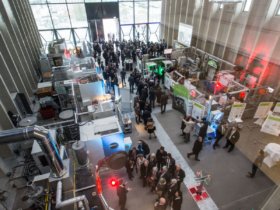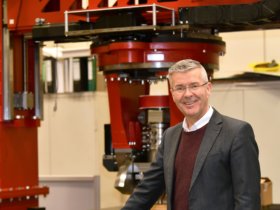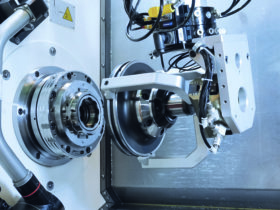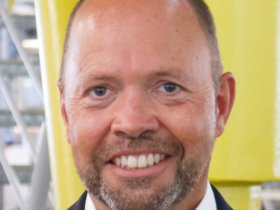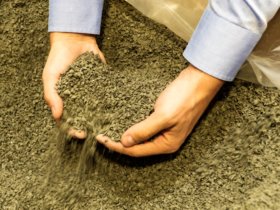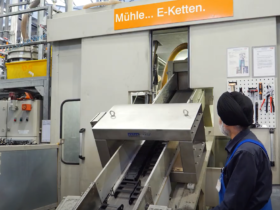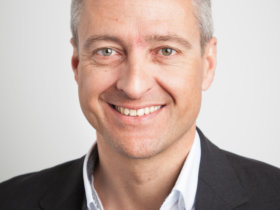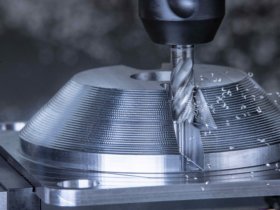Sustainability is focus topic at EMO Hannover 2023
Climate change, environmental protection, energy and material efficiency – sustainability is now an integral part of our daily lives. It will also feature prominently at EMO Hannover 2023.
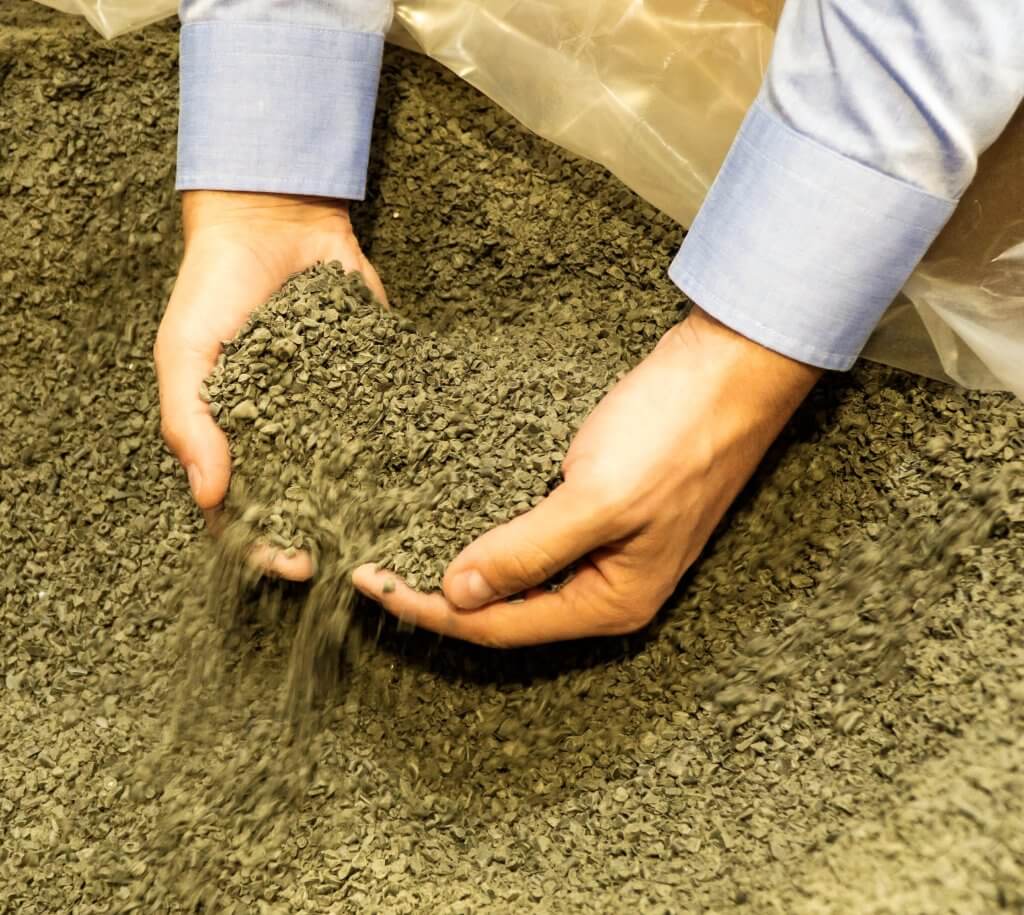
Climate change, environmental protection, energy and material efficiency – sustainability is now an integral part of our daily lives. It will also feature prominently at EMO Hannover 2023. Experts will be presenting ambitious, long-term strategies – and every proposal which is implemented represents a step in the right direction. But how can sustainability goals be met in a practical and, above all, verifiable way? The concrete projects of manufacturing companies and research institutes, as described below, show how production can be made more resource-efficient. All the products are already available and can help companies to adapt their processes.
Milling cutter based on sustainability formula
Ceratizit’s sustainability formula is used to create high-performance tools using sustainable manufacturing techniques. The tool manufacturer has impressive characteristic values to back up its claims. The solid carbide milling cutter series from Ceratizit is particularly popular with customers and is used by many manufacturing companies. Now the tool manufacturer has produced a geometry of the cutter from a specially developed carbide grade with an extremely small carbon footprint. “This ‘Green Carbide’ consists of over 99 percent high-quality secondary raw materials,” reveals Andreas Kordwig, Managing Director at Ceratizit Deutschland GmbH in Kempten. “In addition, we ensure low-carbon manufacturing by using low-emission production processes and energy sources as well as consistently short transport routes throughout the process chain.” At 2.6kg CO2/kg carbide, this allowed us to achieve an unrivalled carbon footprint for a premium carbide grade. “Producing the Green Carbide cutter generates only 4.4kg CO2/kg compared to 19.8kg CO2/kg for one of our conventional cutters,” concludes Kordwig. The tool manufacturer thus achieves a 78 percent reduction in CO2 and improves not only its own carbon footprint. Ceratizit customers will also enjoy the economic benefits in the future thanks to the small certified carbon footprint.
Of course, it is important that not only the sustainability but also the performance parameters are favorable. “We can confirm that the Green Carbide cutter matches the performance of its counterpart made of conventional substrate,” he says, summarizing the results of the company’s own tests. “That’s why we are already offering it to customers as a special tool.” Sustainability and performance are therefore not mutually exclusive at Ceratizit and are opening up new opportunities in the machining industry. EMO Hannover 2023 offers visitors an excellent opportunity to obtain detailed information on this subject.
Driving circular economies forward with innovation
Energy chains often end up in industrial waste and thus in incinerators at the end of their service life. The problem is twofold in that the emissions pollute the environment, and valuable resources are lost forever. These are challenges facing the linear economy which Igus GmbH from Cologne is countering with its own recycling scheme. Customers simply send their disused energy chains – regardless of the manufacturer – to Cologne. There, Igus processes them into regranulate for reuse. Customers receive credit in return for sending in their old chains. A special online platform is available to speed up the recycling process (chainge.igus.de). Owners of old technical plastic parts (such as semi-finished products or gears) can also use this to submit a recycling request, process returns and manage credit for the purchase of new Igus products. “What started as a small idea has rapidly gained momentum,” reports Michael Blass, CEO of e-chain systems. “Since launching the project, we have already collected and recycled over 60 tonnes of high-performance plastics – half of which in 2022 alone.” This allows the Cologne-based company to function as a single-source provider. It is not “just” a plastics producer and supplier, assembly service provider and disposal company, but also a producer and supplier of recyclate. The recyclate is used to create new products, such as the first energy chain made from 100 percent recycled material. What igus offers is therefore unique in this form and contributes to making plastic a sustainable resource. Michael Blass is looking forward to Hanover: “EMO 2023 provides an ideal platform not only for showcasing innovative products but also for engaging with visitors on issues like these, that are so important to the industry.”
Sustainable production down to batch size = 1
How can production processes for low volumes down to a batch size of 1 be made sustainable? Sometimes the answers are quite simple, such as automated clamping device changes.
Machines that can set themselves up while ensuring stable processes are sustainable in three ways.
- Once the process is set up, it usually runs stably, ensuring consistent part quality and low scrap levels – thus conserving resources.
- Servicing, maintenance and repair costs are lower and are incurred only for normal wear and tear. But why? Because scarcely any manual intervention is required for bedding in new programs or retooling with other clamping devices and tools. This also saves resources and additional energy, as it raises the utilization levels of the machine: stopping and starting the machine requires a great deal of energy. In addition, the machine consumes energy even when it is at a standstill and not creating any value.
- If the machine can be run at night and on weekends, this can make it unnecessary to run a second machine.
All this is made possible by rapid-change interfaces from the Marbach-based supplier Hainbuch. They are pre-equipped with chucks, mandrels and special clamping devices, are laid out on a workbench and can be changed by a robot in just a few minutes. The blowing and rinsing functions of the integrated contamination control system maximize process reliability. Various system controls also monitor the changeover process and pass the information on to the machine control system. “The interfaces reduce downtimes and increase productivity, meaning that customers can conserve resources regardless of whether they use our automated or manual rapid-change interfaces,” says Stefan Nitsche, Head of Product Management. Holding to the EMO motto – ‘Innovate Manufacturing’ – we are returning to Hanover with imaginative clamping and automation solutions.”
Meeting the latest challenges with research and industrial development
Germany has undergone thirteen economic cycles over the past seven decades. The companies emerged stronger from them by developing globally competitive products, continuously increasing their productivity and keeping a close eye on their manufacturing costs. Outstanding production, superior automation technology and effective factory organization played a significant role in this. The availability of raw materials and energy at low prices was also crucial. In order to thrive in the current climate, however, further factors must now be met in addition to the conventional parameters (outstanding quality, high productivity even with large numbers of variants, and low manufacturing costs). “These inevitably include greater environmental sustainability. Today, however, this is often reduced almost exclusively to decarbonization, whereas companies should instead be focusing on comprehensive planetary boundaries,” clarifies Prof. Jens Wulfsberg, President of the German Academic Association for Production Technology (WGP). There are also the requirements of social sustainability and global justice throughout the supply chains (working conditions, wages, education and so on). “At the very top of the agenda is resilience, combined with effective deglobalization in order to avoid disruptions in supply chains,” emphasizes Wulfsberg, Professor of Production Engineering at Helmut Schmidt University in Hamburg. The most important issue from today’s perspective is undoubtedly the declining availability of low-cost energy. “However, it should be noted that energy is not a scarce commodity worldwide. Through the use of new technologies, politicians and industry still have it in their hands to provide sufficient quantities of low-cost, non-fossil-based energy,” clarifies Wulfsberg. Overall, companies are starting to call for a multi-dimensional transformation. “WGP is doing all in its power to translate these scientific efforts in the area of industrial development into transformational momentum. Above all, this involves supporting industry in its attempts to increase energy efficiency and to develop a sustainable factory for the world by means of appropriate production machinery, automation and digitalization, and adapted procedures and processes. The scientific societies are at the disposal of companies in the process of shaping these developments. We look forward to seeing you at EMO Hannover 2023.”
((Length: around 9,638 characters including spaces))
Author: Dag Heidecker, specialist journalist, Wermelskirchen
((INFO BOX))
ETA-Fabrik at TU Darmstadt
The research work conducted at the ETA-Fabrik is rooted in the vision of climate-neutral production. The Institute of Production Management, Technology and Machine Tools (PTW) at Darmstadt University of Technology (TU Darmstadt) is conducting research into ways to optimize the energy efficiency, energy flexibility and resource efficiency of typical production facilities in the metalworking industry, as well as into improving the infrastructure in factories for supplying different forms of useful energy. The integrated approach to factory systems is a key focus of research activities. Digital tools are used in many places for this purpose. The ETA-Fabrik uses two actual process chains and several thousand energy data points as a test field and large-scale demonstrator in order to validate the solutions that have been developed.
Further information can be found at www.eta-fabrik.de.
((INFO BOX))
Future of Sustainability in Production
Innovation and change are part of the DNA of production technology. As the world’s leading trade show for the industry, EMO Hannover plays a key role in shaping the far-reaching changes in working methods, technology, sustainable production and the organization of production and business processes. In the Future of Sustainability section, we address sustainability as a task facing society as a whole. It has a major impact on companies in the manufacturing industry. Everyone can help make industry fit for the future. Learn more about current trends in energy efficiency, the integration of renewable energies, circular economies, life cycle concepts, alternative drives and much more at www.emo-hannover.de/future-of-sustainability-in-production. Exhibitors can also register for the joint Sustainability in Production Area to present tomorrow’s state-of-the-art sustainable production solutions to the international trade audience.
Background
EMO Hannover 2023 – World’s Leading Trade Fair for Production Technology
International manufacturers of production technology will be presenting smart technologies for the entire value chain at EMO Hannover 2023 from 18 to 23 September 2023. Under the banner of Innovate Manufacturing, the world’s leading trade fair for production technology will showcase the entire range of modern metalworking technology which is at the heart of every industrial production process. The latest equipment will be on display, as will efficient technical solutions, product-related services, sustainable production methods and much more besides. The main focus of EMO Hannover is on cutting and forming machine tools, manufacturing systems, precision tools, automated material handling, computer technology, industrial electronics and accessories. EMO visitors come from all major industrial sectors including machine and plant construction, the automotive industry and parts suppliers, aerospace technologies, precision engineering and optics, shipbuilding, medical engineering, tool and mold making, steel and lightweight construction. EMO Hannover is the number one international meeting place for the industry. More than 2,200 exhibitors from 47 countries attracted nearly 120,000 trade visitors from around 150 countries at EMO Hannover 2019. EMO is a registered trademark of the European machine tool association Cecimo. EMO is organized by the VDW (German Machine Tool Builders’ Association), Frankfurt am Main, Germany.
Contact
Ceratizit Deutschland GmbH
Norbert Stattler
Marketing – Communications
Daimlerstr. 70
87437 Kempten
Germany
Tel. +49 831 57010-3405
Fax +49 831 57010-3649
Norbert.Stattler@ceratizit.com
www.cuttingtools.ceratizit.com
Hainbuch GmbH
Spannende Technik
Melanie Bernard
Press and Public Relations
Erdmannhäuser Str. 57
71672 Marbach
Germany
Tel. +49 7144 907-219
Fax +49 7144 907-270
melanie.bernard@hainbuch.de
www.hainbuch.com
Igus GmbH
Michael Blass
CEO e-chain systems
Spicher Str. 1a
51147 Köln
Germany
Tel. +49 2203 9649-380
mblass@igus.net
www.igus.de
WGP – German Academic Association for Production Technology
c/o Laboratorium for Manufacturing Technology (LaFT): University of the Federal Armed Forces Hamburg
Prof. Jens P. Wulfsberg
President
Holstenhofweg 85
22043 Hamburg
Germany
Tel. +49 40 65412-720
Fax +49 40 65412-839
Jens.wulfsberg@hsu-hh.de
www.wgp.de – www.hsu-hh.de
Dipl.-Ing. Dag Heidecker
Specialist Journalist
Auf dem Scheid 4
42929 Wermelskirchen
Germany
heidecker@daxtr.de
www.daxTR.de
Copy and images related to EMO Hannover are available at
https://emo-hannover.de/anmeldung
https://emo-hannover.de/logo-banner
Follow EMO Hannover on our social media channels
www.youtube.com/metaltradefair
www.linkedin.com/company/vdw-frankfurt
Downloads
Documents
Pictures
Bild 01 EMO2023 Nachhaltigkeit Ceratizit-Milling-SilverLine
Bild 02 EMO2023 Nachhaltigkeit Ceratizit Kordwig Andreas Geschäftsführer
Bild 03 EMO2023 Nachhaltigkeit Igus Energieketten zum Recycling
Bild 04 EMO2023 Nachhaltigkeit Igus Chainge Regranulat
Bild 05 EMO2023 Nachhaltigkeit Igus Michael Blass Geschäftsführer
Bild 06 EMO2023 Nachhaltigkeit Hainbuch Menschen und Robotik
Bild 07 EMO2023 Nachhaltigkeit Hainbuch Automatischer Spanndornwechsel



